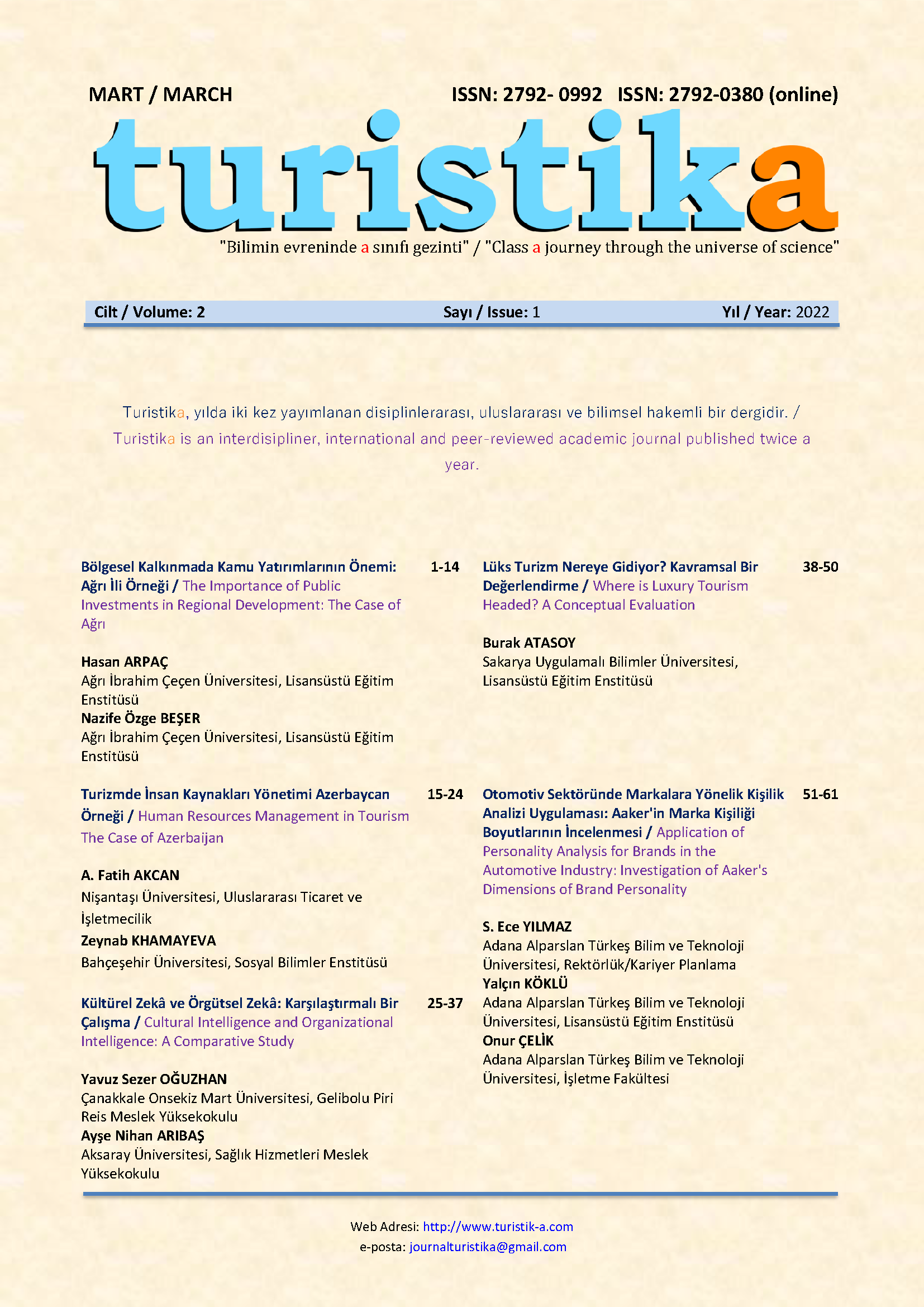
Published 30.03.2022
Keywords
- Tourism Sector,
- Human Resources Management,
- Republic of Azerbaijan
- Turizm Sektörü,
- İnsan Kaynakları Yönetimi,
- Azerbaycan Cumhuriyeti
How to Cite
Copyright (c) 2025 A. Fatif Akcan- Zeynab Khamayeva (Yazar)

This work is licensed under a Creative Commons Attribution-NonCommercial-NoDerivatives 4.0 International License.
How to Cite
Abstract
In the Azerbaijani economy, the human resource management system is an important component that determines the success of the operations of businesses in the hospitality and tourism industry. At the same time, management approaches may vary depending on the size, organizational and legal forms of tourism industry. The aim of the article is to examine the process of creating effective human resources management in hospitality industry enterprises and to develop suggestions for its improvement. In order to achieve this aim, the following objectives have been determined; consider the theoretical and methodological foundations of the human resource management system; To describe the features and problems of the development of human resources in Azerbaijan tourism; provide a balanced scorecard for the motivation system and improvement aspects of human resources; formulate recommendations and recommendations to improve training and human resource development. The theoretical and methodological basis of the work was the work of Azerbaijani and foreign scientists in the field of theory and practice of human resource management.
References
- Bazarova T.Yu. & Eremina B.L. (2002). İnsan Kaynakları Yönetimi. Birlik. Moskova. s.600
- Downes, J., (2007), Progress of a common tourism policy. Travel and Tourism Analyst, s. 74-79.
- Efendizade, S., (2005). Ekoturizm ve Azerbaycan'daki gelişimi için beklentiler. Bakü. s.12
- Gasimov, A. M. (2005). Çalışma İlişkilerinin Yasal Düzenleme Yöntemi Kavramı/ geçiş Döneminde Azerbaycan Cumhuriyeti’nde Devlet ve İnşaatın Fiili Sorunları, Bakü, 2005, s.91-103
- Güluzade, M. M. (2016) Sosyal alanın gelişmesinde insan faktörü ve rolü, Bakü 2016, s.223
- Ivantsevich, J.M. & Lobanov A.A. (2006). Yönetimin insan kaynakları. - M., s. 340
- Koçarlı, Y.A. & Koçarlı, L.R. (2016). Turizm hizmetleri pazarında girişimciliğin sürdürülebilir gelişimini artırmanın yolları. "Azerbaycan Devlet İktisat Üniversitesi Bilimsel Haberleri" Dergisi. Bakü. s.52
- Magura, M. I. (2007). Personel seçim sistemi oluşturmanın temel ilkeleri. / Çalışan yönetimi İş bulma merkezlerinde işsiz veya iş arayan.https://www.sosial.gov.az/ishsizveishaxtaranqeydiyyat
- Mammadov, C. & Rahimov, S. (2009). Açıklayıcı turizm sözlüğü ve ilgili kavramlar. Hukuk yayıncılığı. Bakü, s.9.
- Mindelli, A. E. & Zavarukhin, V. P. (2001). Yenilik Politikasının Uluslararası Yönleri, Dünya Ekonomisi ve Uluslararası İlişkiler dergisi No. 5. s. 551.
- Samedov A. G. & Khudiyeva P. T. (2013). Ticari işletmelerin yönetimi. Bakü. S.520
- Shekshnya, S. V. (2008). Modern Organizasyonların İnsan Kaynakları Yönetimi. - E., 2008., s. 320
- Stane M. & Lloyd A. S. (2017). Planning for Human Resource Development, s.14.
- Stone, R. (1995). Human Resource Management, and Brisbane: Wiley.
- Wright, P. & Snell, S. (1998). Toward a Unifying Framework for Exploring Fit and Flexibility in Strategic
- Yarochkin, V.I. & Buzanova, Y.V. (2008). İşletme ve Girişimciliğin Temelleri. Rusçadan çevrilmiştir. Bakü - İktisat Üniversitesi. s.174
- Yakovets, Y. (2008). Bilimsel ve Teknolojik İlerlemenin Yapısının Yeniden Yapılandırılması: Teori ve Ekonomik Mekanizma: Moskova, s.14
- Azerbaycan Cumhuriyeti İstihdam Stratejisinin Uygulanmasına İlişkin Devlet Programı (2011-2015).
- Azerbaycan Cumhuriyeti Devlet İstatistik Komitesi, https://www.stat.gov.az/
- Azerbaycan Cumhuriyeti İstihdam Stratejisi (2006 2015).

